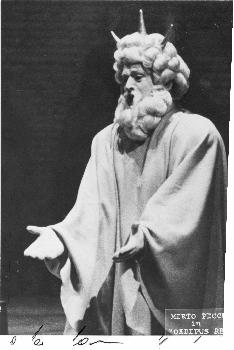Mirto Picchi
I wish to thank Tom Silverbörg for the recording (Folle di gelosia). Picchi's parents produced handmade straw hats; he felt attracted by opera early on, but studied accounting first, obtaining even a doctorate, and worked in a Florence bank for several years: partly to accomodate his father's wish, partly to postpone military service as he was emphatically no friend of the Fascist Italian regime. Eventually, he had to join the army nonetheless, but remained stationed in Tuscany, and managed to deal with his military tasks as passively as possible. Aida – Milano, Palazzo dello Sport, 7 September 1946 Carmen – Wien, Volksoper, 11 January 1947 Un ballo in maschera – Parma, Regio, 5 April 1947 Rigoletto – London, Cambridge Theater, 4 November 1947 Tosca – London, Cambridge Theater, 4 December 1947 La bohème – London, Cambridge Theater, 10 January 1948 Andrea Chénier – Venezia, Campo Sant'Angelo, 10 July 1948 Poliuto – Bergamo, Donizetti, 16 October 1948 Norma – Firenze, Comunale, 30 November 1948 Fidelio – Milano, Scala, 31 January 1949 Boris Godunov (Grigorij) – Roma, dell'Opera, 12 March 1949 Simon Boccanegra – Roma, dell'Opera, 23 March 1949 Die Meistersinger von Nürnberg – Cagliari, Massimo, 5 April 1949 La fanciulla del West – Cagliari, Massimo, 12 April 1949 L'assedio di Corinto – Firenze, Comunale, 4 June 1949 Raskolnikov (by Sutermeister) – Milano, Scala, 21 January 1950 Don Carlo – Firenze, Comunale, 27 May 1950 La resurrezione di Cristo – Venezia, Piazza San Marco, 19 July 1950 Lucrezia Borgia – Milano, Scala, 12 April 1951 La carriera di un libertino – Milano, Scala, 8 December 1951 Proserpina e lo straniero – Milano, Scala, 17 March 1952 Maria d'Alessandria – Milano, R.A.I., 8 April 1952 Wozzeck (Tambourmajor) – Milano, Scala, 5 June 1952 Susanna – Perugia, Basilica di san Pietro,26 September 1952 I cavalieri di Ekebù – Trento, Sociale, 16 October 1952 La figlia del re – Firenze, Comunale, 7 January 1952 Cagliostro – Milano, Scala, 24 January 1953 Nabucco – Lisboa, S. Carlos, 12 March 1953 L'amore dei tre re – Genova, Comunale, 2 May 1953 Guerra e pace – Firenze, Comunale, 26 May 1953 Il vascello fantasma – Bologna, Comunale, 30 October 1953 La damnazione di Faust – Firenze, Comunale, 26 November 1953 Fra Gherardo – Bologna, Comunale, 11 December 1953 Dafni – Palermo, Massimo, 30 March 1954 La foglia di Jorio – Napoli, San Carlo, 4 December 1954 La Wally – Lucca, del Giglio, 14 December 1954 Der Freischütz – Milano, Scala, 27 January 1955 Lo straniero – Roma, dell'Opera, 24 February 1955 Le due giornate – Milano, R.A.I., 16 July 1955 Kamennyj gost – Perugia, Morlacchi, 24 September 1955 Il tabarro – Firenze, Comunale, 29 December 1955 Burlesca – Firenze, Comunale, 20 January 1956 Pantea – Palermo, Massimo, 14 April 1956 Peter Grimes – Roma, R.A.I., 29 September 1956 Antigone (Liviabella, composer) – Milano, R.A.I., 13 October 1956 Alceste – Napoli, S. Carlo, 26 December 1956 Její pastorkyňa (Laca) – Milano, R.A.I., 8 June 1957 Il pirata – Torino, R.A.I., 28 June 1957 Mayerling – Milano, R.A.I., 8 July 1957 Medea – Milano, Scala, 20 September 1957 (recording) Oberon (Oberon) – Milano, R.A.I, 18 October 1957 Hypathia – Milano, R.A.I., 16 November 1957 Nerone – Napoli, S. Carlo, 30 November 1957 I due Foscari – Venezia, La Fenice, 26 December 1957 Khovanshchina – Roma, R.A.I., 14 June 1958 Armide – Torino, R.A.I., 12 July 1958 Francesca da Rimini – Roma, R.A.I., 8 November 1958 Pikovaja dama – Lisboa, S. Carlo, 15 April 1959 La donna serpente – Milano, R.A.I., 14 June 1959 Macbeth – Palermo, Massimo, 14 June 1960 La Griselda – Catania, Bellini, 7 April 1960 Fedra – Napoli, S. Carlo, 15 January 1961 Salome (Erode) – Napoli, S. Carlo, 7 June 1962 Il dibuk – Firenze, Comunale, 21 June 1962 Idomeneo – Napoli, S. Carlo, 10 March 1962 Antigone (Traetta, composer) – Firenze, Comunale, 12 May 1962 Ifigenia – Milano, Scala, 12 October 1962 Sansone – Milano, R.A.I., 15 March 1963 La celestina – Firenze, La Pergola, 28 May 1963 Oedipus rex – Roma, dell'Opera, 19 February 1964 Il prigioniero – Roma, dell'Opera, 19 February 1964 L'amore di Galatea – Palermo, Massimo, 12 March 1964 Maria Antonietta – Palermo, Massimo, 23 April 1964 Matrimonio al convento – Torino, R.A.I., 30 May 1964 Volo di notte (Il radiotelegrafista) – Firenze, Comunale, 18 June 1964 Elektra – Roma, dell'Opera, 22 February 1965 Billy Budd – Firenze, Comunale, 1 June 1965 I rabbini – Torino, R.A.I., 9 July 1965 La sposa sorteggiata – Firenze, La Pergola, 21 May 1966 L'incoronazione di Poppea – Firenze, Comunale, 27 November 1966 Il volo transoceanico – Roma, R.A.I., 29 April 1967 I capricci di Callot – Milano, Scala, 18 January 1968 Semele – Napoli, R.A.I., 2 February 1968 I bassaridi – Milano, Scala, 26 March 1968 Orfeo dolente – Bologna, Cortile Palazzo, 18 July 1968 Clitemnestra – Roma, dell'Opera, 12 February 1969 Wozzeck (Hauptmann) – Bologna, Comunale, 13 December 1969 La vestale – Firenze, Comunale, 5 May 1970 Morte dell'aria – Milano, Piccola Scala, 10 May 1971 Lorenzaccio – Venezia, La Fenice, 7 September 1972 Le nozze di Figaro – Milano, Scala, 19 April 1974 Reference: Mirto Picchi, Un trono vicino al sol, Edizioni del Girasole, Ravenna, 1978 Reference: Mirto Picchi, E lucevan le stelle, Bongiovanni, Bologna, 1981 |

